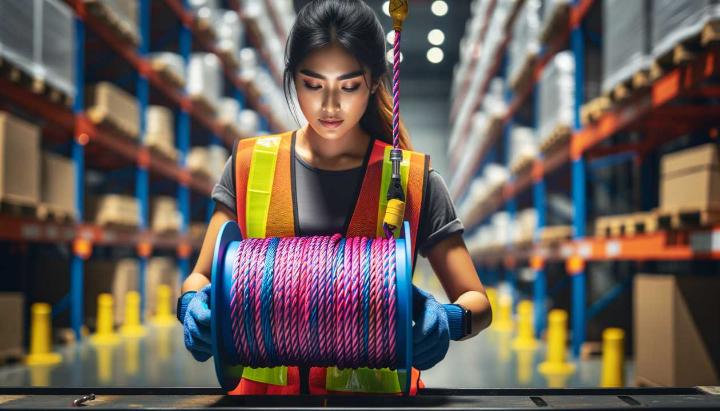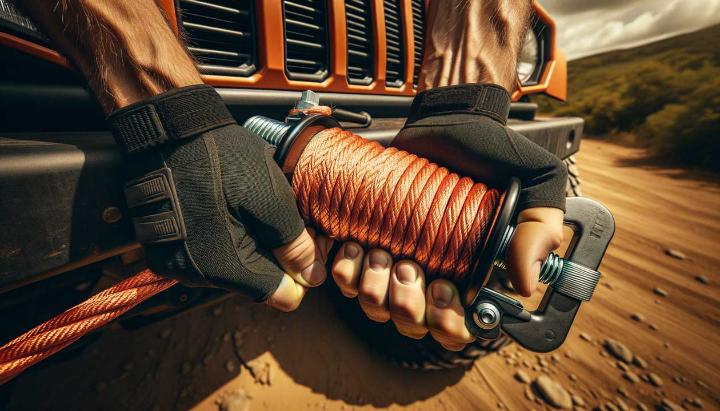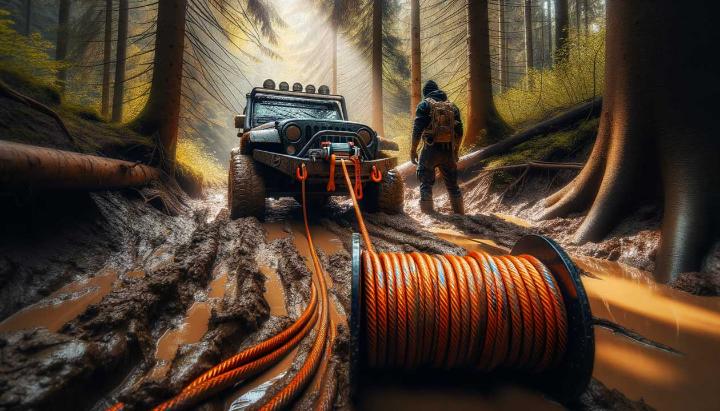Imagine a winch line that can withstand the toughest conditions, yet feels as light as a feather in your hands. A line so strong, it can tow a full-size truck with ease, yet so smooth that handling it is an absolute delight. Welcome to the world of synthetic winch lines, where sheer power meets unparalleled performance.
As off-roaders and outdoor enthusiasts, we demand the very best from our gear. Traditional steel cables have long been the go-to choice, but advancements in synthetic materials have revolutionised the winching game. Synthetic winch lines are rapidly gaining popularity, offering a game-changing combination of strength, durability, and user-friendly features that are hard to match.
In this comprehensive guide, we'll dive deep into the world of synthetic winch lines, uncovering their remarkable advantages, exploring the key factors to consider when selecting the perfect line for your needs, and unveiling the top brands and recommendations that will take your adventures to new heights. Get ready to embark on a journey where performance meets versatility, and innovation redefines what's possible in the realm of winching.
Understanding the Benefits of Synthetic Winch Lines
When it comes to winching, the strength and durability of your line can make all the difference. Traditional steel cables may have served their purpose, but the latest synthetic winch lines offer a game-changing combination of power and performance. Imagine a line that's lighter, stronger, and more resistant to the elements – that's the beauty of synthetic winch ropes.
Strength-to-Weight Ratio of Synthetic Winch Ropes
One of the most impressive advantages of synthetic winch lines is their incredible strength-to-weight ratio. For instance, a 3/8" synthetic line can boast a breaking strength of over 20,000 lbs, yet weigh only a fraction of a steel cable with the same strength. This lightweight nature not only makes handling and maneuvering the line easier but also reduces the overall strain on your winch system.

Durability and Abrasion Resistance of Synthetic Winch Lines
Synthetic fibers like Dyneema and Technora are renowned for their exceptional durability and resistance to abrasion. These high-performance materials are engineered to withstand the toughest conditions, ensuring your winch line won't fray or break prematurely. However, it's essential to handle and store synthetic lines with care to prevent unnecessary damage from UV exposure, chemicals, or excessive heat.
To further enhance durability, many synthetic winch lines feature protective coatings or sleeves that shield the core fibers from wear and tear. This added layer of protection ensures your line remains reliable and long-lasting, even in the most challenging environments.
- Lightweight yet incredibly strong
- Superior abrasion resistance
- Minimal stretch for precise winching
With their unbeatable strength-to-weight ratio, durability, and abrasion resistance, synthetic winch lines are quickly becoming the preferred choice for off-roaders, outdoor enthusiasts, and anyone seeking high-performance winching capabilities. But remember, proper care and handling are essential to maximize the lifespan of these advanced lines.
Selecting the Best Synthetic Winch Line: Key Factors to Consider
When it comes to winching, selecting the right synthetic line can make all the difference. With so many options on the market, it's essential to consider several key factors to ensure you choose a line that meets your specific needs and delivers reliable, high-performance winching capabilities.
Understanding Synthetic Winch Line Materials
Synthetic winch lines are typically made from ultra-high-molecular-weight polyethylene (UHMWPE) fibers, such as Dyneema or Spectra, or liquid crystal polymer (LCP) fibers like Technora. Each material offers unique properties and strengths:
- Dyneema is renowned for its exceptional strength and abrasion resistance, making it an excellent choice for heavy-duty winching applications.
- Spectra is a lightweight and highly flexible UHMWPE fiber that offers excellent strength and resistance to chemicals and UV rays.
- Technora is a high-performance LCP fiber known for its superior heat resistance, making it ideal for winching in extreme environments.
When selecting a synthetic winch line, consider the specific conditions and demands of your intended use to choose the material that best suits your needs.
Determining the Optimal Winch Line Diameter and Length
The diameter of your winch line plays a crucial role in determining its load capacity and overall performance. A thicker line can handle heavier loads but may be more challenging to handle and maneuver. Conversely, a thinner line offers improved flexibility and maneuverability but may have a lower weight rating.
To select the appropriate diameter, consider your winch's pulling capacity, the expected loads, and the terrain you'll be navigating. Most manufacturers provide guidelines and charts to help you match the line diameter to your specific winch and application.

Additionally, consider the length of the winch line you'll need. Longer lines may be necessary for challenging terrain with obstacles or for increased distance between your vehicle and the anchor point. However, excessively long lines can become cumbersome and increase the risk of tangling or snagging.
Safety Factors and Breaking Strength Considerations
When it comes to winching, safety should be your top priority. That's why it's crucial to consider the safety factor and breaking strength of your synthetic winch line. The safety factor is the ratio of the line's breaking strength to the maximum anticipated load, and it helps ensure a sufficient margin of safety during winching operations.
Industry standards typically recommend a minimum safety factor of 3:1 for most winching applications, but higher safety factors may be advisable for more demanding or critical situations. For example, a safety factor of 8:1 or higher is recommended for overhead lifting or when human lives are at stake.
To determine the required breaking strength of your winch line, multiply the maximum anticipated load by the desired safety factor. This calculation will help you select a line with a breaking strength that exceeds the expected load, providing an extra layer of protection against potential failures.
Remember, when it comes to winching, safety should always be the top priority. Take the time to carefully consider these key factors and choose a synthetic winch line that not only meets your performance needs but also offers the highest level of safety and reliability.
Advantages of Using Synthetic Rope Winch Lines
While traditional steel cables have been the go-to choice for winching applications, synthetic rope winch lines are rapidly gaining popularity among off-road enthusiasts and outdoor adventurers alike. These high-performance lines offer a unique blend of strength, durability, and safety features that are hard to match. But what truly sets them apart are the unparalleled advantages they bring to the table.
Lightweight and Easy Handling
One of the most noticeable benefits of synthetic winch ropes is their featherweight construction. Compared to steel cables, these lines are substantially lighter, making them a breeze to handle and maneuver. Imagine the ease of coiling and uncoiling a line without feeling the strain on your arms and back. This lightweight nature not only reduces fatigue but also makes it easier to carry and transport your winch line, especially when exploring remote locations or tackling challenging terrains.
Additionally, synthetic ropes are incredibly flexible and less prone to kinking or tangling, ensuring smooth and efficient winching operations. And here's the real game-changer: these lines don't develop those nasty, sharp burrs that can easily slice through your gloves and skin. With a synthetic winch rope, you can handle it with bare hands without worrying about potential cuts or abrasions.

Safety and Durability
When it comes to winching, safety should always be the top priority. Synthetic winch ropes offer a distinct advantage in this regard – they don't store kinetic energy like steel cables. In the unlikely event of a line failure, a synthetic rope won't recoil violently, significantly reducing the risk of damage or injury to you, your vehicle, or bystanders.
But safety isn't the only forte of these remarkable lines. Synthetic ropes are engineered to withstand the harshest conditions, thanks to their exceptional resistance to abrasion, UV exposure, and harsh chemicals. Whether you're navigating rugged off-road trails or braving extreme weather conditions, your winch line will remain resilient and reliable, ensuring you can tackle any challenge that comes your way.
And let's not forget about the impressive working load limits and tensile strengths of synthetic winch ropes. With their high-performance fibers, these lines can handle heavy-duty winching tasks with ease, making them suitable for a wide range of demanding applications.
Flexibility and Low Maintenance
Synthetic winch ropes are true masters of flexibility. Unlike steel cables, which can develop permanent kinks or memory when stored on winch drums, these lines maintain their suppleness and shape, even after extended use. This flexibility not only ensures smooth deployment and retrieval but also makes it easier to store and transport your winch line.
But the perks don't stop there. Have you ever encountered a frayed or damaged section on your winch line and dreaded the thought of replacing the entire length? With synthetic ropes, you can bid farewell to such worries. These lines can be easily repaired in the field, extending their lifespan and saving you from unnecessary replacement costs.
And let's not forget the low-maintenance nature of synthetic winch ropes. Unlike steel cables that are prone to rust and corrosion, these lines require minimal upkeep, saving you time and effort while ensuring they remain in top-notch condition for years to come.
Whether you're an avid off-roader, a seasoned outdoor adventurer, or simply someone who values high-performance winching capabilities, synthetic rope winch lines offer a compelling combination of advantages that are hard to ignore. So, why settle for less when you can elevate your winching game with a line that delivers unparalleled strength, safety, and versatility? For more insights on the latest advancements in winch ropes, check out our article on Why Amsteel Winch Rope Outperforms Steel Wire Rope.
Top Synthetic Winch Line Recommendations
Are you searching for the ultimate synthetic winch line to take your off-road adventures to new heights? Look no further! In this section, we'll dive into the top synthetic winch line options on the market, highlighting their key features and strengths to help you make an informed decision.
Benefits of Synthetic Winch Lines
Before we delve into specific recommendations, let's quickly revisit the compelling advantages of synthetic winch lines over traditional steel cables:
- Lightweight yet incredibly strong – With their incredible strength-to-weight ratio, synthetic lines offer unparalleled power without the bulk.
- Superior abrasion resistance – Premium synthetic fibers like Dyneema and Technora are engineered to withstand the toughest terrains, ensuring your line stays intact and kink-free.
- Minimal stretch for precise winching – The low stretch characteristics of synthetic lines give you enhanced control and accuracy during winching operations.
Popular Synthetic Winch Line Brands
Now, let's dive into some of the leading brands in the synthetic winch line market:
- Warn – A pioneer in the off-road industry, Warn offers a range of premium synthetic winch lines in various diameters and lengths, suitable for a wide range of applications.
- Smittybilt – Known for their rugged and reliable products, Smittybilt's synthetic winch lines are constructed with top-quality Dyneema fibers for uncompromising performance.
- Rough Country – Catering to the needs of off-road enthusiasts, Rough Country's synthetic lines boast impressive breaking strengths and abrasion resistance.
- Yankum Ropes – This specialized brand focuses solely on synthetic winch lines, offering a diverse selection of options tailored to different winching scenarios.

While each brand has its own unique offerings, it's important to carefully evaluate the key specifications, such as breaking strength, diameter, and length, to ensure they align with your specific winching needs and requirements.
How to Choose the Right Synthetic Winch Line
With so many options available, selecting the perfect synthetic winch line can be a daunting task. Here are a few key factors to consider:
- Breaking strength – Always choose a line with a breaking strength that exceeds your anticipated load requirements, factoring in an appropriate safety margin.
- Abrasion resistance – Evaluate the line's resistance to abrasion and wear, as this will determine its longevity and durability in harsh environments.
- Stretch characteristics – Minimal stretch is desirable for precise winching control, but some applications may benefit from a slightly stretchier line.
- Cost and brand reputation – While premium lines may come at a higher price, investing in a reputable brand can ensure quality and reliability.
Additionally, don't hesitate to seek guidance from experts or tap into the wealth of knowledge shared by off-road communities. Their firsthand experiences can provide invaluable insights into choosing the right synthetic winch line for your specific needs. For more information on high-strength winch ropes, check out our article on Discover High-Strength Synthetic Winch Rope for Sale.
With this comprehensive guide, you're now equipped with the knowledge to confidently select a top-performing synthetic winch line that will elevate your adventures to new heights. Remember, investing in the right gear can make all the difference when conquering rugged terrain and tackling challenging obstacles.
Unlock High Performance with Premium Synthetic Winch Lines
Synthetic winch lines have revolutionised the winching landscape with their unrivalled performance and high strength. These lines, made from advanced materials like Dyneema and Technora, offer a superior strength-to-weight ratio, making them lightweight yet incredibly strong. Their durability and resistance to abrasion, UV, and chemicals ensure long-lasting reliability, while the minimal stretch provides precise control. Whether you're an off-roader or outdoor adventurer, the best synthetic winch line can dramatically enhance safety by reducing recoil risk and improving winching efficiency across various applications. Considering these benefits, upgrading to a synthetic winch rope is a worthwhile investment. For personalised advice, please fill in the form above to get in touch with our rope specialists.